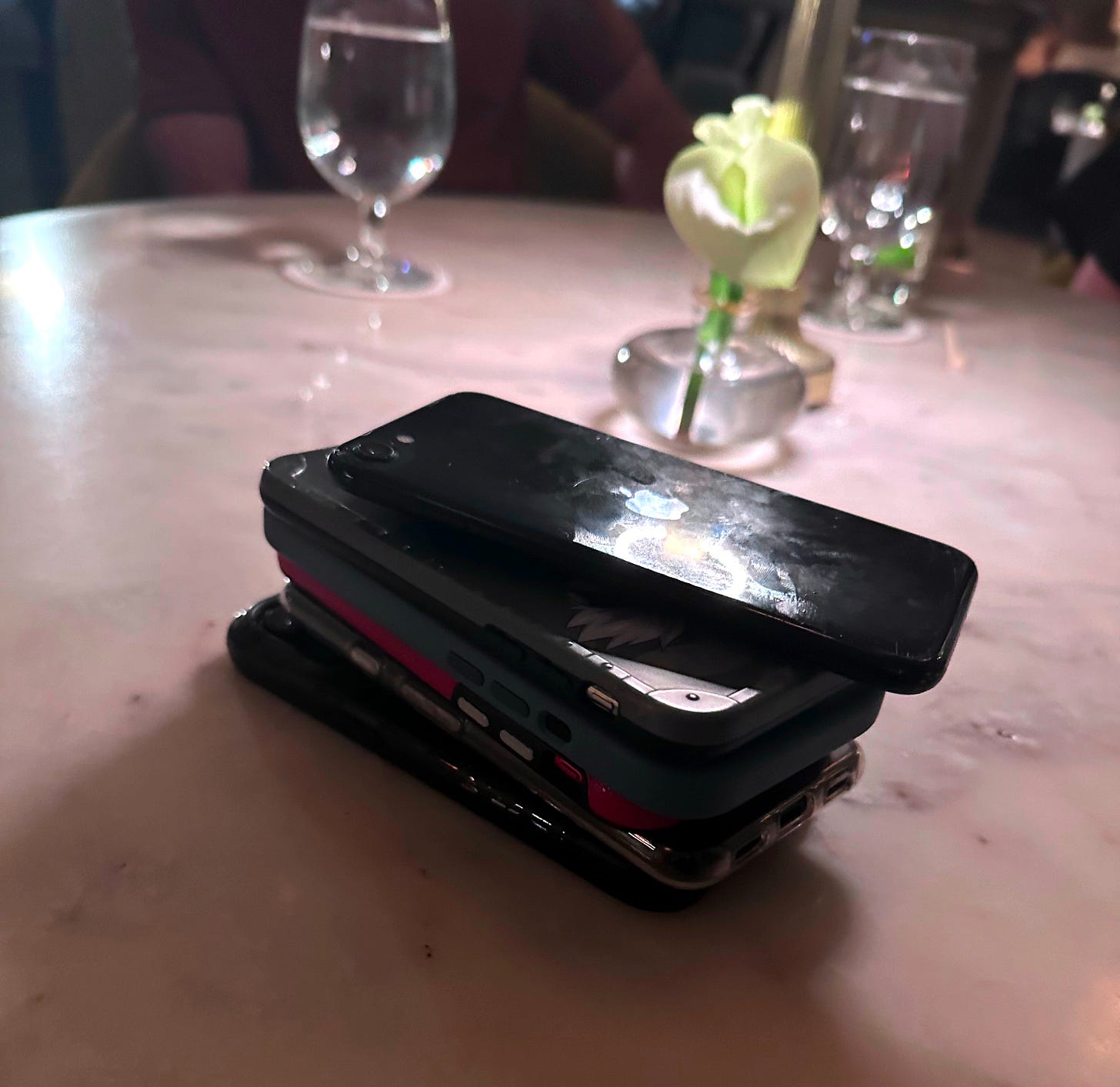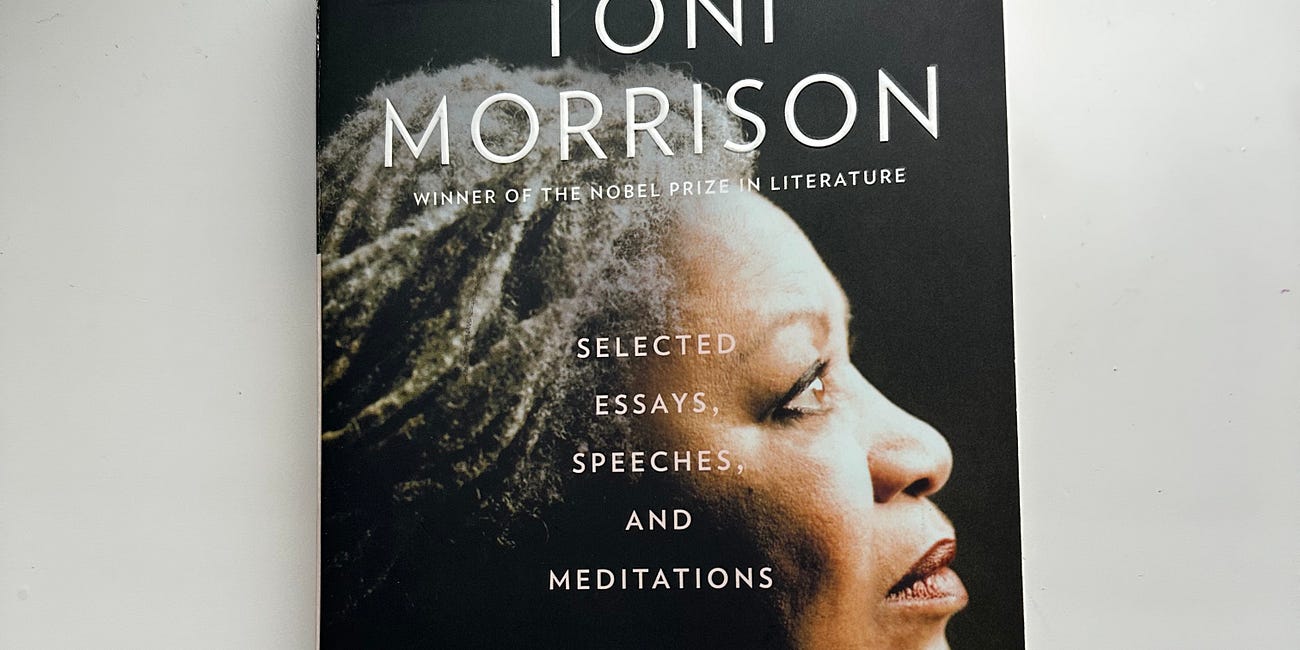What is one book, movie, TV show, etc. that found you at exactly the right moment in your life?
This is how I opened up the dinner salon I hosted this past weekend. The seed of this idea was planted after I read Toni Morrison’s essay “Literature and Public Life” which can be found in The Source of Self-Regard.1 This essay found me in an in-between season of my life. Now that I am in a new city, I am trying to reconnect with friends from the past and make new ones.
At the same time, I’m writing full-time and need to feel part of an intellectual community. I wanted what James Baldwin had in Paris, a community of people sharing daring ideas over coffee or a meal. (Many years ago, I visited Baldwin’s favorite cafe– Café de Flore in Paris. It was an ordinary cafe which means it’s the people that made it extraordinary).
I think I have a romanticized notion of a postmodern intellectual public sphere because of my alma mater where to live what Hannah Arendt called “the life of the mind” was the highest aspiration. The relentless exchange of ideas was a reminder that curiosity should never be a luxury, but an essential for daily living. In college, curiosity felt unnecessary. I’m here to get good grades. Now, I’ve come to realize that the Life of the Mind ™️ can’t be manufactured in classrooms, it must be intentionally pursued beyond the university.
Since college, I’ve been relentlessly pursuing it. I’m the kind of person who will linger with friends 4 hours after watching Jordan Peele’s Us, debating the meaning of the ending and the social critique embedded in every scene.2 We’re all tethered. I made a friend at a dinner party a couple of years ago after having a lively debate about a particular novel that you all may really love, but I have substantial critiques so I won’t name it here lol. The point is these kind of spaces and conversations matter.
My sense of space has been unsettled now that I travel so much. But increasingly I’m realizing it’s not about the spaces themselves, but the people who fill them. This is why I have a deep desire to curate experiences for people to connect in spaces around the world.
Why? Because we’re living in a connection crisis.3 We’re more connected than ever, so easily reachable, yet so out of touch with one another. This isn’t a new phenomenon. Toni Morrison effortlessly describes what’s been happening to public and private lives in her essay “Literature and Public Life.”
Here’s an excerpt:
During the eighties and nineties, technology and the regime of the electronically visual world have altered perception of the public and our experience of one another. (The current Age of the Spectacle promised intimacy and universalization in a global village setting. But it has delivered frightful confusion about private and public existence.) Following the demise of the much maligned sixties and seventies, during which there was an actual, contested, fought over, fought for, and fought against public (and publicly expressed) life, it seems unlikely that there will ever be a decade like that: where issues of conscience, morality, law, and ethics were liberationist rather than oppressive. And it is interesting to note that it is a decade that, unlike any previous one, is embarrassed by itself. That kind of public life (the Civil Rights movement, etc.) is not experienced as media phenomena made possible by "the enormous weight of advertising and media fantasy (which suppresses the realities of division and exploitation; (disguises the disconnexion [sic] of private and public existence." The consequence may be apathy, disgust, resignation, or a kind of inner vacuum (numbness), "a dream world of artificial stimuli and televised experience," where, as F. Jameson observed, "never in any previous civilization have the great metaphysical preoccupations, the fundamental questions of being and the meaning of life, seemed so utterly remote and pointless." That was 1971 when those comments were made and they are inapplicable to some degree now, when product ethics and media ethics have greater force than social ethics or justice.
This essay was written 20 + years ago and tech companies are still trying to sell us hopes of intimacy, communities, and connections. In reality, social media is like small talk. You spend a few seconds scrolling to get the major life updates, spoken and unspoken. Much like small talk, you exchange pleasantries in the comments. If you’re really feeling adventurous you send a DM. Or you just lurk because you only met this person once and you exchanged instas to “keep in light touch.”
I’m not sure social media is a place for profound connections anymore. Instead, it’s a place for monitoring following people. It’s a marketplace for comparison, a shallow stream for engagement, and an amplifier of all the good, bad, and ugly.
Yet, social media isn’t the only problem. Screens are everywhere and we’re partially addicted to them and partially reliant on them for everyday tasks. For this reason, the connection crisis is not just about the screens. They’re not going away.
I know what you’re thinking — Well, what is it, shae???
So much of our lives have become increasingly fragmented. The utility of third spaces has significantly shifted. The need and use of religious gatherings, parks, libraries, rec centers (do we have non-monetized hobbies anymore?) coffee shops, etc. have become optional or very expensive. We’re more mobile than ever (how many people do you know moved to Florida or Texas since the pandemic?) so even in-person connections can be difficult to make when it’s easy to move to a new city whenever or get all your books from Libby instead of commuting to a library.
Ultimately, I think we’re all starved for deep connections, tired of snacking on surface-level snippets of each other’s lives.
What is the solution?
I emailed/texted some people I’ve met in my city recently and invited them to a dinner Salon. I picked a restaurant I’ve been meaning to try out. The invite guaranteed an evening of curated conversations and relaxation, but there’s a catch.
No one is allowed to use their devices for the first 90 minutes of the salon.
I wanted my guests to be present in the beautiful restaurant space and engage with the company right in front of them. I curated a list of 30 questions, one of which you read at the beginning of this essay. Meditating on past experiences and profoundly moving conversations I’ve had with strangers and friends alike, I felt like I knew myself more deeply after curating these questions.
No one was required to answer every single question, only the ones that compelled them. The questions were designed such that people could share as little or as much as they wanted. I even left pauses in the evening for people to have one-on-one conversations with their neighbors.
In all honestly, I didn’t think people would actually show up or turn off their devices. These are busy people with intricate lives who need their phones. Yet every single one of my guests switched their devices off, relieved to be unreachable for some time.

When the food came out, we all joked that it was a shame we didn’t have our phones to be able to capture it. Yet, it wasn’t really a shame. We just simply savored the food and the moment.
3 hours passed by and people had still not touched their phones even though they were allowed to after 90 minutes. Like a good aftertaste, people just lingered long after the dinner was over. It was just quite simply magical.
The perspectives shared, the ideas born, and the new friendships made energized me so much that the next day I finished writing a piece I had been struggling with for weeks. What can I call this? An intellectual high?
We need more experiences like this–ones so good that when you try to explain it to other people all you can say is “You just had to be there.” It can’t be captured on camera or experienced through a screen. You just had to be there…
So don’t worry! You don’t have to join a run club or hurt yourself playing pickleball (no judgment here– I earned another 5K medal the other week). There are people ready to connect, not to go on a date or network, but just to enjoy a good meal in good company.
I’m curious how you would answer the question: What is one book, movie, TV show, etc. that found you exactly at the right moment in your life?
Thank you for tuning into this unpolished stream of consciousness. If you’re moved by this idea, let me know. I’m looking forward to hearing from you.
Addendum: I’ve officially launched , a space for professionals, creatives, and intellectuals to find community, make authentic connections, and explore ideas. If you’re looking to build communities like this one, I encourage you to subscribe.
This post contains affiliate links to bookshop.org. I may earn a small commission from qualifying purchases made through these links. As a full-time graduate student, this helps support the maintenance of this newsletter and is at no additional cost to you. I appreciate your support!
I read the full essay for you here:
This is the essay that changed my relationship with the internet
Technology is fundamentally changing how we relate to one another. You name it– AI, Fast Media, etc.
You can watch the trailer here:
I’ve talked about this before during a series I did on the history of post-modern living over on my history newsletter here:





This is beautiful, especially since I've struggled to make new friends myself, having lost contact with older ones after high-school. It's good to know there's still some kind of hope.
What a wonderful evening! I’ve been searching for groups like the one you described on Meetup. Where does one find them these days?
My book (or one of them) is Eat Pray Love. I was contemplating divorce, on a beach retreat. I walked into a bookstore and was taken in by the stark white cover with a splash of cover in the center and the title.
I love food. At the time I was deep in my spiritual journey. And I’m a hopeless romantic.
The book echoed everything I was feeling. My husband didn’t cheat. We had money problems but nothing we couldn’t work through. We were healthy. We didn’t have children. There was no “real reason” for me to end the marriage, yet I had to get out.
Up to that point, I’d done all the “right” things, and I still wasn’t happy. The book gave me permission to find my own way.